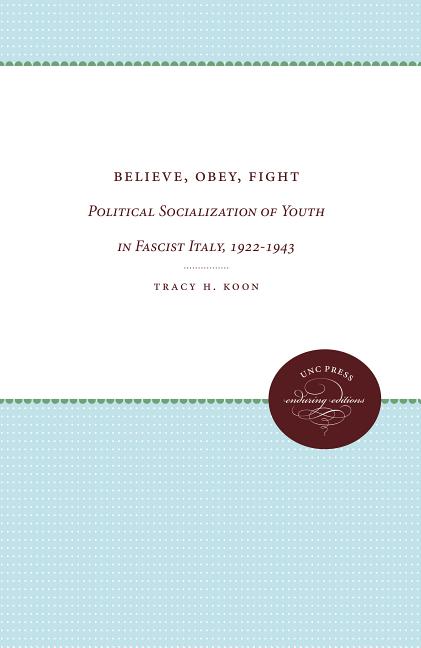
Believe, Obey, Fight: Political Socialization of Youth in Fascist Italy, 1922-1943
The University of North Carolina Press, October 1985. First Edition. Cloth. Used - Very Good / Very Good. Item #268579
ISBN: 0807816523
The Fascist regime under Mussolini regarded its youth as its best hope for the future. Young people were courted more assiduously than any other group in the society and their political socialization became a central concern of the government. Believe, Obey, Fight discusses the various tools used by the Fascist regime from 1922 to 1943 to shape the political values and environment of the young. Tracy Koon focuses on the secondary agents of socialization, including the party, the educational establishment, youth groups, and the media of political communication. She shows that the response to this socialization ranged from apparent consent to dissent and finally to open opposition.
The regime employed several methods to produce consensus among the young. Koon's analysis begins with a discussion of the rhetorical style of Mussolini's message and the key political myths manipulated by his propaganda machine: fascism as continuing revolution and social justice, the glories of ancient Rome, the hygienic function of war and violence, the religious spirit of the new creed, and the omniscience of the leader. She then describes the pre-Fascist educational system, the "most Fascist" Gentile reforms of 1923, and the later revision of those reforms by zealous party men engaged in the Fascist regimentation of teachers and students and the militarization and politicization of curricula and textbooks.
Equally important agents of socialization were the Fascist groups organized for young people from their earliest years through the university level, including the annual national competitions and forums in which members could express their ideas on a range of issues. The regime provided physical, military, sports, and political training to strengthen the new Fascist society.
Fascist socialization did for a time create a superficial consensus by appealing to both the love of conformity that marks the very young and the economic fears that caused students to conform in the hope of jobs. But Koon argues that the regime's attempt to exert totalitarian control over the young deprived them of personal identity. As time passed, the contradictions of the regime became clearer, the chasm between Fascist rhetoric and reality more obvious. In the end, the majority of young people came to believe that the regime had given them nothing to believe in, no one to obey, and nothing for which to fight.
Originally published in 1985.
A UNC Press Enduring Edition -- UNC Press Enduring Editions use the latest in digital technology to make available again books from our distinguished backlist that were previously out of print. These editions are published unaltered from the original, and are presented in affordable paperback formats, bringing readers both historical and cultural value.
Octavo. In bright clean dustjacket. Pink salmon colored cloth covered boards with white lettering to spine. Penny brown end pages. Tightly brown. Foxing/dust stained top textblock edge. Unmarked internal text. [343 pp.]
Used Book
Price: $25.00



